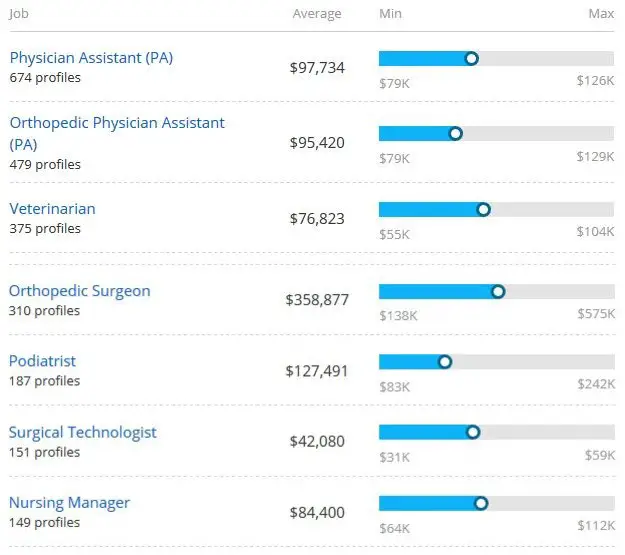How to become a Surgeon
This article provides in-depth information into What is a Surgeon? What Surgeons do? Degrees for Surgeons, Steps to become Surgeon and much more.
Surgeons are highly trained medical doctors who specialize in performing major surgical procedures. These professionals will often specialize in a particular area of the body, such as the nervous system or musculoskeletal system. Surgeon treats patients affected by physical deformities, functional difficulties, injuries or diseases. They also prescribe pre- and post-operative care, which may include medications, antibiotics or special diets. Here is a career guide which emphasis on the steps, courses, disciplines required to become surgeon.
What does a Surgeon do ?
Surgeons perform operations and other medical procedures to treat injuries, diseases, and deformities.
-
Use medical instruments to perform corrective or preventative surgery.
-
Examine patients.
-
Order medical and diagnostic tests and analyze results.
-
Advise patients on procedures and healthcare.
-
Prescribe pre- and post-operative care like medications, antibiotics or special diets.
-
Communicate with patients about their condition and any preventative healthcare.
Steps for becoming a Surgeon
1
Earn A Bachelor’s Degree
Before entering medical school, aspiring surgeons must complete undergraduate school to earn a bachelor's degree. Medical schools generally don’t require a particular college major in order to apply. However, applicants have to complete numerous undergraduate premedical courses, including physics, inorganic chemistry, biology and organic chemistry.
2
Clear Medical College Admission Test (MCAT)
During your senior year of college, you will need to take and do well on the Medical College Admission Test (MCAT). Your test scores will then be sent out to your various application schools and this, combined with your overall academic profile, will determine whether or not you are admitted.
3
Graduate From Medical School
Medical school usually takes at least four years to complete. Students will spend the first two years primarily in the classroom and lab, learning procedures and surgical practices. Then, they will transition to working on skills under the supervision of an experienced surgeon. Students may enroll in an allopathic medical program, which results in a Medical Doctor (M.D.) degree, or in an osteopathic program, which results in a Doctor of Osteopathic Medicine (D.O.) degree. While both prepare students to become a surgeon, osteopathic programs place more emphasis on preventative medicine and the musculoskeletal system.
4
Complete A Residency Program
While students are in medical school, they evaluate certain residency programs that have an emphasis on their desired area of specialty and apply for the program and spend somewhere between three to seven years completing it. Students will essentially serve as a surgeon under supervision.
5
Add A Fellowship
After finishing the residency program students will have the option to continue their training as a part of a fellowship. Fellowship provides a student with the time to focus even more closely on a surgical subspecialty, like cardiothoracic measures. Many fellowships will also provide financial and academic support for publishing.
6
Get Licensed
Along with extensive, formal training from an accredited medical school, all states require surgeons to obtain medical licensure. Licensure entails passage of the United States Medical Licensing Examination (USMLE) or the Comprehensive Osteopathic Medical Licensing Exam (COMLEX).
Surgeon Degree Levels
Bachelors
A Bachelor’s degree is the first step to become a surgeon. These 4-year degrees do not have to focus specifically on medicine; however, curricula should focus heavily on the physical sciences to prepare students for the strong emphasis on science in medical school. Courses in anatomy, biology, chemistry, math, and physiology may be beneficial.
Biology
-
Cell Biology
-
Molecular Biology
-
Genetics
Objectives
-
Understand a wide range of organisms
-
Understand principles of biological function
-
develop practical biological skills
Organic chemistry
-
Organic Nomenclature
-
Stereochemistry
-
Hydrocarbons
Objectives
-
Understanding of chemistry
-
Develop skills in scientific investigations
-
Develop interest in chemistry
Inorganic chemistry
-
Atomic/Molecular View of Matter
-
Scientific Measurements
-
Energy And Chemical Change
Objectives
-
Provide a foundation in chemistry
- Problem-solving with a molecular perspective.
-
Use of modern instrumentation
Masters
In this 4 year program, your first two years are spent taking basic science courses, such as biochemistry, anatomy, physiology, pathology, pharmacology, and microbiology. Your last two years are spent gaining patient care experience and completing clinical rotations in family practice, internal medicine, surgery, obstetrics and gynecology, pediatrics and psychiatry.
Medical Biochemistry
-
Chromatographic methods
-
Basal metabolism
-
Integrated metabolism
Objectives
-
Understand complex biological systems
-
Understand Chemical functions in humans
-
Understand Biological Evolution
Gross Anatomy
-
Anatomic Pathology
-
Back And Thorax
-
Introduction to the PNS and ANS
Objectives
-
Study of anatomical variants
-
Understand anatomy and physiology
- Analyse structure of cells
Pediatrics
-
Health Supervision
-
Growth and Development
-
Nutrition
Objectives
-
To understand causes of diseases in children
-
Control the spread of infectious disease
-
Promote healthy lifestyles
| Minumum Credit Score | Apply in as little as | Variable APR | Fixed APR | ||
|---|---|---|---|---|---|
 | Not Available | 15 minutes or less | 2.95 | 4.74 | View disclosures |
 | 620 | 2 minutes | 5.38%-16.99%1 | 4.43%-16.99%1 | View disclosures |
 | Not Available | 15 minutes | 1.13% - 11.23%¹ (with autopay) | 3.50% - 12.60%¹ (with autopay) | View disclosures |
